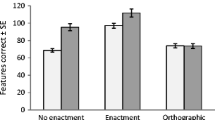Summary
In Experiment 1, recall and recognition of 80 action phrases were compared under two encoding conditions: verbal and motor (performing the denoted acts). Memory performance was better under motor encoding than under verbal encoding, and more so in recognition than in recall. We assume that this finding is due to the item-specific effect of a specific motor component in the memory trace after enacting. In Experiments 2 and 3 we further investigated whether false-alarm rates are dependent on the motoric similarity of distractor items. The rate of false alarms was lower under motor encoding than under verbal encoding, but the motoric similarity of distractor items to list items did not influence the false alarms. The results were interpreted as support for the assumption that motor encoding enhances item-specific information in relation to verbal encoding, but that during verbal recognition the motoric quality of the depicted movement is not processed.
Similar content being viewed by others
References
Bäckman, L., & Nilsson, L.-G. (1984). Aging effects in free recall: An exception to the rule. Human Learning, 3, 53–69.
Cohen, R. L. (1981). On the generality of some memory laws. Scandinavian Journal of Psychology, 22, 267–281.
Cohen, R. L. (1983). The effect of encoding variables on the free recall of words and action events. Memory & Cognition, 11, 575–582.
Cohen, R. L. (1985). On the generality of the laws of memory. In L. G. Nilsson & T. Archer, Animal learning and human memory. Hillsdale: Erlbaum.
Einstein, F. O., & Hunt, R. R. (1980). Levels of processing and organization: Additive effects of individual item and relational processing. Journal of Exerimental Psychology: Human Learning and Memory, 6, 588–598.
Einstein, G. O., & McDaniel, M. A. (1987). Distinctiveness and the mnemonic benefits of bizarre imagery. In M. A. McDaniel & M. Pressley, Imagery and related mnemonic processes. New York: Springer.
Engelkamp, J. (1987). Modalitätsspezifische Gedächtnissysteme im Kontext sprachlicher Informationsverarbeitung. Zeitschrift für Psychologie, 195, 1–28.
Engelkamp, J., & Krumnacker, H. (1980). Imaginale und motorische Prozesse beim Behalten verbalen Materials. Zeitschrift für experimentelle und angewandte Psychologie, 27, 511–533.
Engelkamp, J., & Zimmer, H. D. (1983). Zum Einfluß von Wahrnchmen und Tun auf das Behalten von Verb-Objekt-Phrasen. Sprache & Kognition, 2, 117–127.
Engelkamp, J., & Zimmer, H. D. (1985). Motor programs and their relation to semantic memory. German Journal of Psychology, 9, 239–254.
Helstrup, T. (1989). Loci for act recall: Contextual influence on processing of action events. Psychological Research, 51, this issue.
Hunt, R. R., & Einstein, G. O. (1981). Relational and item-specific information in memory. Journal of Verbal Learning and Verbal Behavior, 20, 497–514.
Kausler, D. H., Lichty, W., & Hakami, M. K., Freund, J. S. (1986). Activity duration and adult age differences in memory for activity performance. Journal of The Psychology of Aging, 1, 80–81.
McDaniel, M. A., Einstein, G. O., & Lollis, T. (1988). Qualitative and quantitative considerations in encoding difficulty effect. Memory & Cognition, 16, 8–14.
Neely, J.H., & Balota, D. A. (1981). Test-expectancy and semantic organization effects in recall and recognition. Memory & Cognition, 9, 282–300.
Paivio, A. (1971). Imagery and verbal processes. New York: Holt, Rinehard, & Winston.
Paivio, A. (1986). Mental representations. A dual coding approach. New York: Oxford University Press.
Snodgrass, J. G., & Corvin, J. (1988). Pragmatics of measuring recognition memory: Applications to dementia and amnesics. Journal of Experimental Psychology: General, 117, 4–50.
Tulving, E. (1983). Elements of episodic memory. New York: Oxford Univ. Press.
Tulving, E., & Thomson, D. M. (1971). Retrieval processes in recognition memory. Effects of associative context. Journal of Experimental Psychology, 87, 116–124.
Zimmer, H. D. (1984). Enkodierung, Rekodierung, Retrieval und die Aktivation motorischer Programme (Arbeiten der FR Psychologie, No. 91). Saarbrücken: Universität des Saarlandes.
Zimmer, H. D. (1986). The memory trace of semantic or motor processing. In F. Klix & H. Hagendorf (Eds.), Human memory and cognitive capabilities (pp. 215–223). Amsterdam: North Holland.
Zimmer, H. D. (1987). Argumente für ein motorisches Gedächtnissystem. In K. Lorenz, B. Sandig, & J. Engelkamp (Eds.), Wissensrepräsentation und Wissensaustausch. St Ingbert: Röhrig-Verlag.
Zimmer, H. D., & Engelkamp, J. (1984). Planungs- und Ausführungsanteile motorischer Gedächtniskomponenten und ihre Wirkung auf das Behalten ihrer verbalen Bezeichnungen. Zeitschrift für Psychologie, 192, 379–402.
Zimmer, H. D., & Engelkamp, J. (1989). One, two or three memories: Some comments and new findings. Acta Psychologica, 70, 293–304.
Zimmer, H. D., & Engelkamp, J. (1989). Does motor encoding enhance relational information? Psychological Research, 51, this issue.
Author information
Authors and Affiliations
Rights and permissions
About this article
Cite this article
Mohr, G., Engelkamp, J. & Zimmer, H.D. Recall and recognition of self-performed acts. Psychol. Res 51, 181–187 (1989). https://doi.org/10.1007/BF00309146
Issue Date:
DOI: https://doi.org/10.1007/BF00309146




